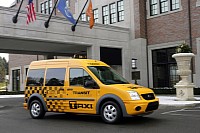
| Monday, September 19, 2011 | Archives | Advertise | Online Buyer's Guide | FLEETSolutions |
Ford Transit Connect Brings A New Shape To New York City Taxis
 The first Ford Transit Connect Taxis in New York City are now in service and soon will be joined by hundreds more as orders and interest soar for the versatile vehicle. The first Ford Transit Connect Taxis in New York City are now in service and soon will be joined by hundreds more as orders and interest soar for the versatile vehicle.The initial Transit Connect Taxis are part of the first order for the vehicle in New York City following the New York Taxi and Limousine Commission's approval of it for use in the Big Apple. The new units feature the iconic "NYC Taxi" painted in black on the two front doors. More than four hundred Transit Connect Taxis are destined for New York City. Total orders for Transit Connect Taxis across the United States are fast approaching 1,000 in its first year on the market. The new taxi market in the U.S. averages about 6,000 units. "Taxi operators are realizing the Transit Connect Taxi is a great vehicle and there's a good reason – they helped us develop it," said Len Deluca, Director, Ford Commercial Trucks. "During product development, we visited cities across the U.S. speaking with taxi owners, operators, drivers and city officials on the key product attributes they wanted in a taxi." Cities where taxicab company operators have ordered Transit Connect Taxis in addition to New York include Los Angeles, Chicago, Las Vegas, St. Louis, Tampa, FL, Orlando, FL., Hartford, CT, and West Haven, CT. In addition to being approved for use by the New York Taxi and Limousine Commission, Transit Connect Taxi has been approved by governing agencies in Chicago, Philadelphia, and Boston – cities that require taxis to meet specialized requirements. The vehicle also has been approved for use at Reagan National Airport and Dulles International Airport by the Metropolitan Washington Airports Authority and at San Francisco International Airport by the SFO Airport Commission. The standard Ford Transit Connect features a 2.0-liter I-4 engine that gets twenty-two mpg in the city and twenty-seven mpg on the highway, an improvement of about thirty percent compared with traditional taxis, and is available with an engine preparation package for conversion to compressed natural gas (CNG) and liquefied propane gas (LPG). Both CNG and LPG lower taxi fleets' operating costs and are better for the environment. California’s first compressed natural gas (CNG)-powered Ford Transit Connect Taxis hit the greater Los Angeles area on September 8. California Yellow Cab of Orange County put its first ten Transit Connect Taxis into service – marked by an event celebrating the increased presence of CNG use in California. Clean Energy, which owns and operates CNG filling stations, also participated in the event. The first ten Transit Connect Taxis are part of an order for fifty units that California Yellow Cab plans to put into service by 2012. In addition, Yellow Cab of Anaheim also ordered sixty-nine units, bringing the total number of CNG Transit Connect Taxis that will soon be servicing Southern California to more than one hundred. CNG-powered Transit Connect Taxis are becoming more popular in other parts of the country as well, servicing places such as Las Vegas and St. Louis. Chicago is another city where CNG-powered Transit Connect Taxis are in service already. Taxi Medallion Management put twelve of the vehicles into service in June. Dallas-based BAF Technologies has been certified by Ford as a Quality Vehicle Modifier to convert standard Transit Connect Taxis into CNG-powered cabs. "Taxicab operators will save up to $2 per gallon over gasoline at the pump," said Mitchell Pratt, Chief Operating Officer, Clean Energy. "Because the vehicles’ tailpipe emissions are near zero, Ford’s CNG Transit Connects qualify to drive in California’s carpool lanes and, compared to petroleum versions, will reduce greenhouse gases by almost thirty percent." Earlier this year, the California Air Resources Board (CARB) approved the use of CNG-powered Transit Connect Taxis modified by BAF Technologies, which is owned by Clean Energy. CARB is a government agency designed to promote and protect public health, welfare, and ecological resources through reduction of air pollutants. In addition to the CARB approval, another factor that is pro-CNG is the increase in infrastructure supporting CNG-fueled vehicles. Since 2001, the number of CNG filling stations in Orange County has tripled to about thirty. The open architecture of the taxi provides increased interior headroom and passenger visibility, and – with 6.5 inches of ground clearance – passengers step easily through the sliding doors. The rear door opening is 50.2 inches wide at the floor and has a height of 52.1 inches. Suspension components and the underbody structure have passed requirements for potholes and curbs. The thirty-nine-foot turning diameter makes it easier to handle tight spots. |
 |
NAFA Fleet Management Association 125 Village Blvd., Suite 200 Princeton, NJ 08540 Telephone: 609.720.0882 Fax: 609.452.8004 |






